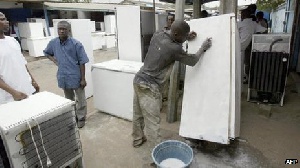The sale of used refrigerators is no longer lucrative for the dealers. This follows the ban on the importation of used refrigerators, freezers and air conditioners, which took effect from January 1, 2013.
Government, through its enforcement of Legislative Instrument (LI) 1932 (2008), recently banned the importation of old refrigerators.
The used electrical appliances, aside containing harmful gaseous substances, pose health risks to users and consume much electricity.
A visit by CITY & BUSINESS GUIDE to Kaneshie First Light, where a lot of second-hand electrical appliances are displayed for sale, revealed that the once-vibrant business had plummeted.
At 10 am, only few shops were open for business at Kaneshie.
A shop owner, who gave his name as Allotey Junior, told this paper that since the ban took effect business had plummeted.
“We hardly get about 10 people coming to buy from us on a daily basis. Before the ban, we used to serve over 20 customers a day.”
He noted that because they could no longer import used fridges, they have been forced to reduce the prices of the remaining stock in order to get rid of the appliances.
“A table top fridge, which sells at GH¢ 300, is now going for GH¢250 and GH¢200 while the double door which originally sells at GH¢450 is now selling at GH¢400,” Allotey emphasized.
Michael Annan, who shared similar sentiments, added that he would sell other used electronic appliances since the new fridges were expensive.
“The average Ghanaian cannot afford it,” he emphasized.
With government’s commitment of GH¢3 million towards encouraging the purchase of new refrigerators over a three-year pilot rebate and exchange programme, it is hoped that many Ghanaians can afford to buy brand new fridges.
Under the project, consumers, who ‘surrender’ their old refrigerator appliances, will be supported financially to pay part of the cost of a new and efficient one.
Consumers, who opt for higher efficiency refrigerator appliances, will also receive further rebates depending on the level of efficiency of their appliances.
Dr. Alfred Ofosu Ahenkorah, Executive Secretary of the Energy Commission, promoters of the project, noted that the ban would save the nation about $33 million annually.
In an interview with this paper, he emphasized that “it is not our objective to destroy anyone’s business but at the same time the country risks being fined by the international community if we continue to import these harmful appliances.”
He indicated that talks were underway with a leading refrigerator manufacturer, which would set a factory in Ghana.
Business News of Tuesday, 29 January 2013
Source: Daily Guide













